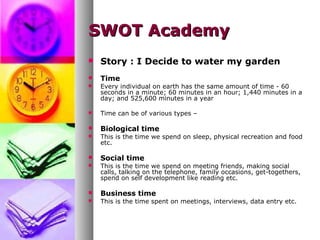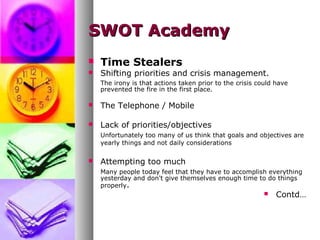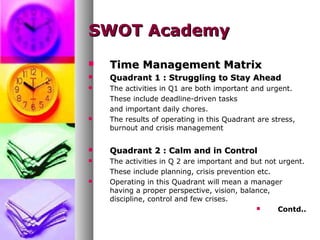Time management
- 1. Believe in your Self, Believe in the Best!!Believe in your Self, Believe in the Best!! 11 SWOT AcademySWOT Academy Time ManagementTime Management
- 2. Believe in your Self, Believe in the Best!!2 SWOT AcademySWOT Academy Time Every individual on earth has the same amount of time - 60 seconds in a minute; 60 minutes in an hour; 1,440 minutes in a day; and 525,600 minutes in a year Time can be of various types – Biological time This is the time we spend on sleep, physical recreation and food etc. Social time This is the time we spend on meeting friends, making social calls, talking on the telephone, family occasions, get-togethers, spend on self development like reading etc. Business time This is the time spent on meetings, interviews, data entry etc.
- 3. Believe in your Self, Believe in the Best!!3 SWOT AcademySWOT Academy Time Mgmt : Where are You ? A. 20% people feel they are short of time. They feel so concerned that they self find answers to Time Mgmt. B. 10% people feel they are short of time. They realize this and are keen to get help and see how they can improve Time Mgmt. C. 70% people feel they are not short of time. Though they don’t mind listening to someone. And then tell him why all that is impractical.
- 4. Believe in your Self, Believe in the Best!!4 SWOT AcademySWOT Academy Time Management is more than just managing time. It is about controlling the use of the most valuable - and undervalued - resource It means changing those habits or activities that cause waste of time. It is being willing to adopt habits and methods to make maximum use of time. With good time management skills one is in control of one’s time, stress and energy levels. One can maintain balance between one’s work and personal life, finds enough flexibility to respond to surprises or new opportunities It does not matter how hard You work or how much Time You spend working, but what matters is HOW much You achieve in a given period of time
- 5. Believe in your Self, Believe in the Best!!5 SWOT AcademySWOT Academy Time Stealers Shifting priorities and crisis management. The irony is that actions taken prior to the crisis could have prevented the fire in the first place. The Telephone / Mobile Lack of priorities/objectives Unfortunately too many of us think that goals and objectives are yearly things and not daily considerations Attempting too much Many people today feel that they have to accomplish everything yesterday and don't give themselves enough time to do things properly. Contd…
- 6. Believe in your Self, Believe in the Best!!6 SWOT AcademySWOT Academy Time Stealers Ineffective delegation The best managers have an ability to delegate work to staff and ensure it is done correctly. This is probably the best way of building a teams moral and reducing your workload at the same time. The general rule is -this; if one of your staff can do it 80% as well as you can, then delegate it. Deciding what to delegate: Select capable, willing people to carry out jobs: Delegate complete jobs: Explain why the job is done, and what results are expected: Then let go! Drop in visitors The five deadliest words that rob your time are "Have you got a minute". Everyone's the culprit-colleagues., the boss, your peers. Contd..
- 7. Believe in your Self, Believe in the Best!!7 SWOT AcademySWOT Academy Time Stealers Procrastination The biggest thief of time; not decision making but decision avoidance. The inability to say "no!" The general rule is; if people can dump their work or problems on to your shoulders they will do it Meetings Hold meetings only when trigger events occur The cluttered desk The most effective people work from clear desks.
- 8. Believe in your Self, Believe in the Best!!8 SWOT AcademySWOT Academy Time Management Matrix Urgent Not Urgent Important Not Important By Stephen Covey S R (The Seven Habits of Highly Effective People; Simon & Schuster) Quadrant 1 Quadrant 2 Crises, Planning, Exercise, Projects, Relationship etc Accidents Etc Quadrant 3 Quadrant 4 Phone Calls, Day Dreaming, TV, Visitors, Procrastination etc Small Talks Etc
- 9. Believe in your Self, Believe in the Best!!9 SWOT AcademySWOT Academy Time Management MatrixTime Management Matrix Quadrant 1 : Struggling to Stay AheadQuadrant 1 : Struggling to Stay Ahead The activities in Q1 are both important and urgent. These include deadline-driven tasks and important daily chores. The results of operating in this Quadrant are stress, burnout and crisis management Quadrant 2 : Calm and in ControlQuadrant 2 : Calm and in Control The activities in Q 2 are important and but not urgent. These include planning, crisis prevention etc. Operating in this Quadrant will mean a manager having a proper perspective, vision, balance, discipline, control and few crises. Contd..
- 10. Believe in your Self, Believe in the Best!!10 SWOT AcademySWOT Academy Time Management MatrixTime Management Matrix Quadrant 3 : Busy going nowhereQuadrant 3 : Busy going nowhere The activities in Q3 are not important but urgent. These include responding the drop in visitor, meetings, mails that do not increase the productivity or effectiveness. Operating in this Quadrant means short term focus, crisis management, broken relationships etc. Quadrant 4 : Aspiring to mediocrityQuadrant 4 : Aspiring to mediocrity The activities in Q 4 are neither important nor urgent. These include busywork, time wasters, junk mail etc. Operating in this Quadrant will mean a total irresponsibility and over dependency. Contd..
- 11. Believe in your Self, Believe in the Best!!11 SWOT AcademySWOT Academy Time Management Tips – Conquer the clutter Defuse distractions Know thyself Eliminate redundancy Group and separate Share the burden Seize the moment Emulate others Make Work Fun Listen to radio and TV news shows to keep up on the latest news; this should enable you to skim through newspapers and magazines. Open and sort through mail as soon as it arrives at your desk or home; handle each piece only once. Eliminate snacking between meals; eat three balanced meals a day
- 12. Believe in your Self, Believe in the Best!!12 SWOT AcademySWOT Academy The ‘Five Time Zone’ Concept To Have a proper balance between monochronic and polychronic aspects of time management the ‘Five Time Zone Concept’ advocated by Lewis, Justus and Storz, Moni Laui The five links in the ‘Five Time Zone’ approach are Vision, Plans, Personal Organization Systems, Commitment Energy. Contd…
- 13. Believe in your Self, Believe in the Best!!13 SWOT AcademySWOT Academy Thank You !Thank You ! Visit us onVisit us on www.facebook.com/swot.academy Write to us onWrite to us on swotacademy@gmail.com













